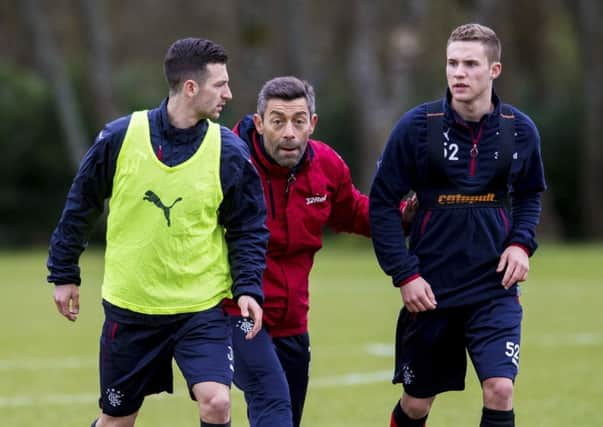Pedro Caixinha warns players he can turn into the devil


So much so, the club’s president Alejandro Irarragorri felt it necessary to recommend Caixinha avail himself of the services of a life coach in order to channel his energies in a more productive manner.
The result is that, according to Caixinha himself, Rangers are employing a manager who now has a much longer fuse. He has certainly been charm personified during his first few days in the job. Caixinha, though, also revealed he has been at pains to stress to the players now under his charge that they would be well advised to ensure his darker side remains hidden.
Advertisement
Hide AdAdvertisement
Hide Ad“I told them they will get everything from me,” said the Portuguese coach as he reflected on his first week of training with the Ibrox squad. “But I also told them ‘if you try and do something the opposite way from what I want, you will see the devil in front of you.’ They will see the devil in a human body.
“Their response? There was no response at all. Were they scared? No, not at all. If they are scared, they cannot perform at all. But it was just a case of me being up-front with them and passing on what I am and what I want from them.”
If that has echoes of an old-school, disciplinarian approach to handling players, Caixinha insists his style of management is multi-layered, with much of his focus on a more cerebral method of getting the best from a squad.
“I have a Masters degree in sports science and wrote a dissertation on the psychological side of things,” he said. “I’ve always loved that side of it, because I believe if you change the way players think, you change a lot. If you change their hearts, then you don’t change that much.
“Being a manager is about managing illusions, managing criticism, managing expectations, managing the games. When I was in Mexico, the president of the club was a fantastic guy.
“One day he came to me in my office. He drew on the board a big pie, like a pizza, and he drew a lot of slices. He said ‘regarding training you are nine out of ten. Preparing the team, you are nine out of ten. Regarding relations with the players you are eight, and so on.
“But then he said ‘sometimes you need to control your anger, you need to control your character’. I realised from that moment it was important for me to know that and to work on it. So I started working with a life coach.
“He was watching the picture from outside, not a psychologist but a coach who tells you how to manage those situations, how to manage with the players, how to manage with the press, how to manage with yourself.
Advertisement
Hide AdAdvertisement
Hide Ad“I’m a guy who looks to be detail-oriented all the time. It needs to start with me, if I want other guys to behave in a way they need to do. But it’s also about identity. My genes are my genes. My character is my character. If I’m not going to be myself it’s not me, so it would be finished. Kaput.
“The people who are the best at what they do identify the things they need to improve. That’s the one big question and I told it to the players this week. I need loyalty from the players, totally.
“Let me tell you, we were working on something this week and trying something different. I was trying to explain to them the reason why. That’s where I always start. And they said ‘okay, if this is what the gaffer says then we go, we do it.’ But I said ‘no’. I don’t want you to go against the wall and break down. No. It’s a question of what we can do together.
“I’m not going to ask the players to do something they cannot do. Not ever. So it’s not a case of ‘the gaffer says so, so we go.’ Okay, it’s good to know they are prepared for that, but we need to be clever and understand.
“I don’t want the players to buy into what I’m doing or saying, I want them to be convinced by it. We are already learning and by getting together and matching ideas, it leads to them being convinced.”
Caixinha’s first opportunity to start convincing the Rangers support of his worth comes at Ibrox tomorrow when they face Hamilton Accies on Premiership business.
“We can’t change that much in the first few days,” he added. “But it’s always important to have a good start in your first game in charge. It’s important to start looking like we have changed the shape. The players have to follow behaviours we want them to perform on the pitch. From what I have seen in training so far, I really believe we are going to do something different.”